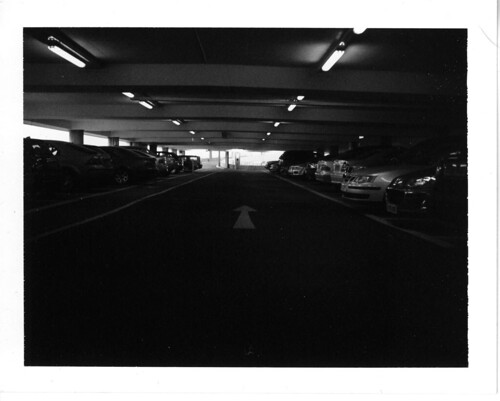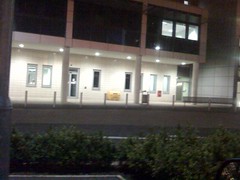
I was going through my archives and realised that I never posted this photograph. It was taken in the multi-storey car park at Edinburgh Airport in the spring of 2006, very shortly after that car park was built, a quick shot with an old folding Polaroid packfilm camera (shot on Type 667, if you’re interested in such details).
I have a couple of those cameras lying around, to one of which I applied a very rough conversion to use modern batteries. The other is half-awaiting a more refined version of the same procedure.
I did go back and try to duplicate the shot with a ‘real’ camera (my wife’s 6x6 Bronica, if you must know), and I believe it’s one of a set of negatives that’s been waiting to be scanned ever since. Next time I get the scanner out I’ll have to find them.

This is my routine. Three days a week, at the moment, I find myself sitting in the car outside Belfast City Hospital; I'm waiting for my wife. While her work day notionally ends at 5 pm, the realities of caring for patients mean that while I may see her shortly after 5, it could be half an hour, an hour, sometimes much longer before she climbs into the seat beside me.
I could spend three or four hours in a week just sitting here, waiting.
There is a temptation to call this wasted time, time when I could handily be somewhere doing something, but these few hours are instead precious to me, and when other commitments (generally a work thing in the evening for one or other of us) mean that I'm not here to collect my wife, I miss this time.
With everything else calling for attention, when I sit here I don't get the computer out; I rarely make a phone call; I don't have the room to write comfortably. Instead, I can just sit.
It's one of the few opportunities I get to read a book, or to relax with a puzzle played on the screen of my phone. I might listen to a podcast, or an audiobook run through the car stereo. I may even tap out a blog post, one letter at a time.
It doesn't really matter what I do, just that this is the time in my day when nothing else can take my attention, purely by virtue of where I am. That's precious.
It says something of me that I need circumstances to force this space on me before I can take these pleasures without guilt. Othertimes, that sneaking niggle is always there.
It's almost Advent, a season of reflection and anticipation — both attitudes and activities that require space and time. The Mockingbird's Leap (see the sidebar) is to be reconvened, a call to attention to the little graces that surround. That, too, requires the beat, the break in the scurry and hurry.
Rhythm is found as much in the spaces between the beats as in the beats themselves. There is a need to find that rhythm in a day, a week, a year.
I wrote here recently that Advent is my favourite season. It is for many reasons, but foremost are the quiet, the darkness, the anticipation and the yearning for what is to come, the presence of the fullness of life, of life itself.
I sit here waiting, in more ways than the obvious.
A couple of days ill last week provided way more random browsing time than was necessary, which means another linkdump much sooner after the last one than is normal. Some of these are worth it, though.
I had a post planned for this evening, but then I checked in on Google Reader and saw this thoughtful piece from Alan in Belfast on the travails of the Presbyterian Mutual Society.
I’m inclined to describe his comment as containing a little of the prophetic — in the sense of the Biblical prophet speaking out to identify both what has gone wrong and what can put it right.
Alan cuts deep, identifying the inconsistencies in the actions of the Presbyterian members of the Mutual, whose Presbyterian identity is surely built around notions of grace, community and mutual concern.
Instead the mess at the Mutual has come about thanks to the same thing that has been happening on a global scale: “If I put my money over there then I might come out of things with just a few pennies more,” and we’d rather not think about the consequences of all this. The problem is that we’re all too connected to and dependent on each other for that to work…
| There are a few kinds of fiction that I’m a total sucker for: SF and some gentler fantasy, things with zombies. And vampires — ever since I read Anne Rice’s Interview With A Vampire at an impressionable age. I’ve had the occasional awkward conversation (“Do you really think a good, Christian lad should be (reading |
watching) that kind of thing?”), but my response is generally along the lines of, “It’s fiction. Fick-shun.” I don’t think it’s done me any harm. Actually, I think I’m well past due a re-read of Jim Butcher’s excellent Dresden Files. (I keep meaning to post about Dresden — there are some interesting things to talk about from those books.) |
That’s the background. Here’s the fun.
A series of books I haven’t read, by Stephenie Meyer, is starting to make it’s way to film; the first, Twilight, has hit cinemas in the States and will do so here around the middle of next month. It’s about a girl who falls in love with a vampire, and it all sounds very teenager-y angst-y: just the kind of thing that gives YA fiction a bad name.
Cue tension.
In the red corner we have the concerned Christians, represented by Jonathan McKee. (I used to follow quite closely what he wrote, but got a bit turned off when he relaunched his site and resources as The Source for Youth Ministry. The teeth were also a problem, although that shot shows them as a bit less extremely white than I recall.) Actually, I don’t want to slabber too much as what he’s been saying is generally of the “take care and make your own decisions” variety. I’ll never pretend that the media we expose ourselves to can’t influence us to a frightening degree (although I have a suspicion we get distracted by the bits that don’t pretend to be anything more than a good story and let a great volume of much more insidious material go past unchallenged), and that’s always good advice.
What I find amusing is the contrast between the counsel on McKee’s site and this outraged piece on io9.
Short version: in the blue corner we have a SF/fantasy blog up in arms over the books’ expression of the author’s Mormon morality:
The more you examine author Stephenie Meyer's themes, the more obvious it becomes that her books are a thinly-veiled religious screed against teen sex.
...
Of course Meyer should be allowed to write her own values into Twilight and its sequels, but we are doing young readers a disservice by rubber-stamping these books without a forewarning of what lies within.
And it goes on.
Poor Stephenie Meyer. She seems a little bit out on her own.

